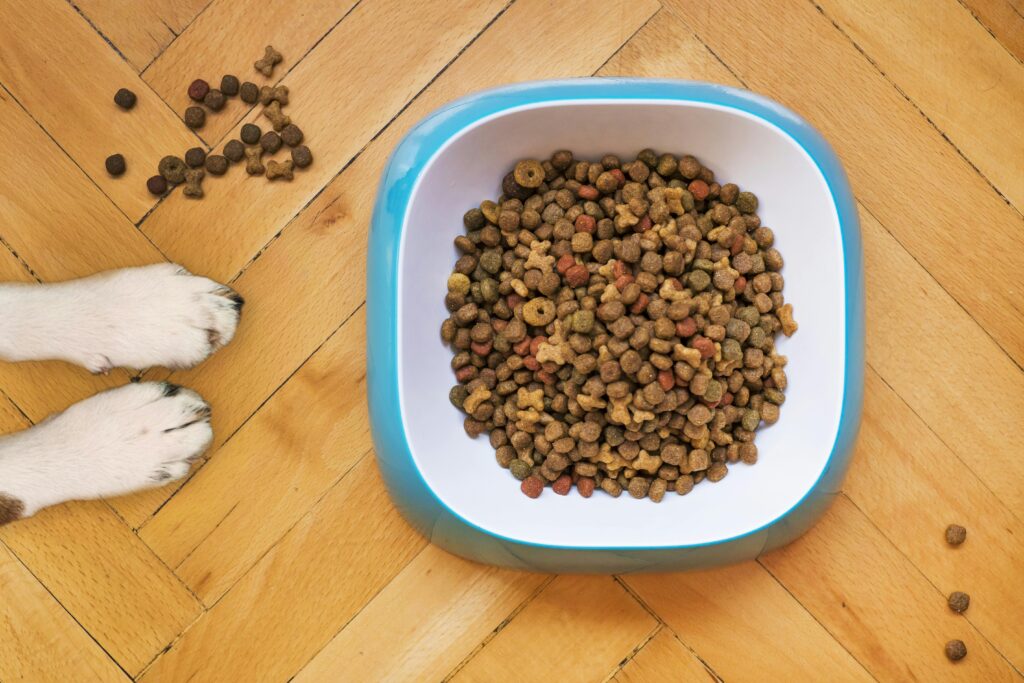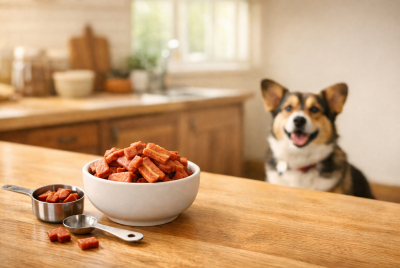The Best Treats For Dogs With Sensitive Stomachs
We may earn a commission for purchases made using our links. Please see our disclosure for more details.
If you’re a dog parent, you know how heartbreaking it is to see your pup struggle with tummy troubles. One wrong treat and suddenly, they’re dealing with diarrhea, vomiting, or gas that could clear a room. Some dogs just have delicate digestive systems, and finding the right treats for them can feel like a game of trial and error.
But don’t worry! There are plenty of delicious, tummy-friendly options out there. In this guide, we’ll explore the best treats for dogs with sensitive stomachs, key ingredients to look for, what to avoid, and even some simple homemade recipes. Let’s make treat time enjoyable again—for both you and your furry friend.
Why Do Some Dogs Have Sensitive Stomachs?
Just like people, some dogs can eat almost anything without an issue, while others react badly to the smallest dietary change. There are a few reasons why your dog might have a sensitive stomach. Genetics play a role, as some breeds—like German Shepherds, French Bulldogs, and Boxers—are naturally more prone to digestive issues. Others develop food sensitivities over time, reacting poorly to certain proteins, grains, or additives.
Underlying health conditions can also contribute to stomach issues. If your dog has frequent digestive problems, it’s always a good idea to check with a vet. Stress can be another factor. Some dogs experience stomach upset simply due to changes in their environment or routine. Whatever the cause, making sure they have the right treats can go a long way in keeping them comfortable and happy.
Signs Your Dog Has a Sensitive Stomach
Your dog can’t exactly tell you when they’re not feeling well, but their body language and bathroom habits can give you plenty of clues. Frequent diarrhea or loose stools are often the biggest signs. If your pup vomits shortly after eating or seems to have constant gas, their digestive system might be struggling.
Another sign is a lack of appetite. Dogs with sensitive stomachs may shy away from food or treats they associate with discomfort. Some pups even become lethargic or lose interest in playtime when their stomach is upset. If you notice any of these signs regularly, choosing the right treats and diet is essential.

Ingredients to Look for in Treats for Sensitive Stomachs
When it comes to choosing treats, simple is always better. Dogs with sensitive stomachs tend to do well with limited-ingredient options, meaning fewer components to trigger digestive issues. Lean proteins like chicken, turkey, and salmon are gentle on the stomach while still being packed with nutrition.
Pumpkin is a fantastic ingredient that helps regulate digestion and can firm up loose stools. Sweet potatoes are another excellent option, offering fiber and vitamins while being easy to digest. Oatmeal is a mild grain that provides slow-burning energy without being too harsh on sensitive tummies. Some treats also include probiotics, which help support a balanced gut and improve digestion.
Ingredients to Avoid
Just as some ingredients can help your dog’s digestion, others can make things much worse. Artificial additives, including colors, flavors, and preservatives, should always be avoided. These unnecessary extras can irritate a dog’s stomach and cause reactions.
Dairy is another common problem. While some dogs can tolerate small amounts, many are lactose intolerant and react poorly to cheese, yogurt, or milk-based treats. Wheat and corn are often used as fillers in cheaper treats, but they can be difficult for some dogs to digest and may trigger allergies. Fatty or greasy foods should also be avoided, as they can lead to pancreatitis and serious digestive distress.
Meat by-products are another red flag. These are low-quality meat sources that often contain indigestible parts of animals. If the ingredient list is vague about where the meat is coming from, it’s best to steer clear.
Best Store-Bought Treats for Sensitive Stomachs
There are plenty of great store-bought options if you know what to look for. Freeze-dried chicken or turkey treats are an excellent choice since they contain only one ingredient and are easy to digest. Salmon-based treats provide not only a stomach-friendly protein source but also omega-3 fatty acids that help with overall gut health.
Pumpkin and sweet potato chews are another fantastic option. They are packed with fiber and naturally soothing to the digestive tract. Hypoallergenic dog biscuits, made specifically for sensitive stomachs, are also widely available. Some brands even make probiotic-infused treats, which can actively improve digestion over time.
Homemade Treats for Dogs with Sensitive Stomachs
Making treats at home is a great way to ensure your pup gets high-quality ingredients without any unnecessary fillers or additives. Simple recipes can go a long way in keeping their tummy happy.
A great option is pumpkin and oatmeal cookies. By mixing canned pumpkin, oats, and an egg, you can create a delicious, easy-to-digest snack. These can be baked at 350°F for about 15 minutes.
Sweet potato chews are another easy homemade treat. Simply slice a sweet potato into thin strips and bake them at 250°F for a few hours until they reach a chewy consistency.
Banana and peanut butter bites are also a hit. Mash a banana, mix it with a couple of tablespoons of peanut butter (make sure it doesn’t contain xylitol), and add oat flour to form a dough. Bake at 325°F for about 10 minutes, and you’ll have a tasty, dog-friendly treat.
How to Introduce New Treats to Your Dog
Even the most stomach-friendly treat can cause issues if it’s introduced too quickly. Dogs thrive on consistency, and any sudden change in their diet can lead to digestive upset. The best approach is to start small. Give your pup a tiny piece of the new treat and watch for any reaction over the next 24 hours.
If there’s no sign of an upset stomach, you can gradually increase the amount. If you notice any digestive issues, it’s best to discontinue the treat and try a different one. Every dog reacts differently, so patience is key when introducing something new.
How Many Treats Should You Give?
It’s tempting to keep tossing treats to your pup, especially when they look at you with those big, hopeful eyes. But even the healthiest treats should be given in moderation. Overfeeding treats can lead to weight gain and disrupt their diet.
For small dogs, one to two treats a day is usually enough. Medium-sized dogs can handle two to three treats, while larger breeds can have three to five. Keeping treats as an occasional reward rather than a constant snack is the best way to maintain a healthy balance.
Scientific Insights on Canine Digestive Sensitivity and Treats
Research has shown that digestive sensitivity in dogs varies significantly based on size, with larger breeds often experiencing softer stools due to differences in intestinal permeability and colonic transit time. A comprehensive review, Digestive Sensitivity Varies According to Size of Dogs: A Review, highlights how tailored diets based on a dog’s size can improve digestive health (PubMed). Additionally, a study titled The Science of Snacks: A Review of Dog Treats explores the booming dog treat market, noting that owners prioritize natural, meat-based, and locally sourced options due to perceived health benefits. The review also emphasizes the role of treats in strengthening the emotional bond between owners and their pets (Frontiers in Animal Science). These studies reinforce the importance of choosing appropriate, size-specific treats that support gut health while ensuring dietary balance.

Pet Care Products for Dogs with Sensitive Stomachs
For dogs with digestive issues, the right pet care products can make a significant difference. From specialized treats to gut-supporting supplements, Amazon offers a variety of products designed to keep your pup happy and healthy. Here are some highly rated options that can help manage sensitive stomachs.
1. Purina Pro Plan Veterinary Diets FortiFlora Probiotic Supplement
A go-to probiotic for many veterinarians, Purina Pro Plan FortiFlora supports digestive health by introducing beneficial bacteria into your dog’s gut. It helps with diarrhea, promotes a healthy immune system, and is easy to sprinkle over food. It’s especially helpful for dogs experiencing stomach sensitivity due to dietary changes or stress.
2. Blue Buffalo Basics Limited Ingredient Diet Dog Treats
For pups that need a simple, grain-free snack, Blue Buffalo Basics Limited Ingredient Treats are an excellent choice. Made with turkey as the primary protein and free from artificial preservatives, these crunchy treats provide a delicious option without common allergens like dairy, wheat, or soy.
3. Hill’s Science Diet Sensitive Stomach & Skin Dry Dog Food
If your dog’s stomach issues stem from their daily meals, switching to Hill’s Science Diet Sensitive Stomach & Skin can help. This formula includes prebiotic fiber for digestive health, omega-6 fatty acids for skin nourishment, and easily digestible ingredients to support overall wellness.
4. Native Pet Organic Pumpkin for Dogs
Pumpkin is one of the best natural remedies for digestive upset, and Native Pet Organic Pumpkin Powder makes it easy to add this fiber-rich superfood to your dog’s diet. Unlike canned pumpkin, this powdered form is shelf-stable and can be mixed with water for a fresh, soothing treat.
5. Greenies Pill Pockets for Dogs
If your pup needs medication or supplements but refuses to take pills, Greenies Pill Pockets are a lifesaver. These soft treats are designed to hide pills while being gentle on sensitive stomachs. Available in flavors like peanut butter and chicken, they make medicine time much easier.
These products offer a variety of ways to support your dog’s digestive health, whether through diet, probiotics, or gentle treats. Choosing high-quality, stomach-friendly items can help ensure your pup stays comfortable and happy, no matter how sensitive their tummy may be.
Final Thoughts
Finding the best treats for a dog with a sensitive stomach doesn’t have to be overwhelming. It’s all about keeping things simple and paying attention to how your pup reacts to different ingredients. Whether you opt for store-bought treats or make your own, choosing natural, gentle ingredients can make a huge difference.
Avoiding artificial additives, dairy, fatty foods, and questionable meat sources will help keep your dog’s digestion on track. With a little trial and error, you’ll find the perfect treats that make your dog happy without any tummy troubles.
FAQs
What proteins are best for sensitive stomachs?
Chicken, turkey, salmon, and lamb are the easiest for dogs to digest while still providing essential nutrients.
Can dogs eat fruit as treats?
Yes! Bananas, blueberries, and apple slices (without seeds) are great natural treats for dogs with sensitive stomachs.
What should I do if a new treat upsets my dog’s stomach?
Stop giving it immediately and switch to bland, easy-to-digest foods like plain white rice and boiled chicken.
Are grain-free treats better for sensitive stomachs?
Not necessarily. Some dogs do well with grains like oatmeal, while others need grain-free options. It depends on your dog’s specific sensitivity.
Is peanut butter safe for dogs?
Yes, as long as it’s natural and does not contain xylitol, which is toxic to dogs. Always check the label before giving it as a treat.
Now that you know what to look for, treat your pup to something delicious and stomach-friendly! They’ll love you for it.




